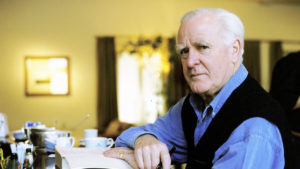Years after I first read The Rachel Papers, I bought the copy of Hamlet that Martin Amis had owned as an Oxford student from a book dealer in Charing Cross. It had his undergraduate jottings in the margins and his own personal bookplate inside the front cover. He must have been a teenager when he stuck it in. Truly, Amis was precocious. He was also brilliant, but not just as a novelist.
Frank Kermode described Amis as “a literary critic of startling power” — and he was right. Amis later tried his hand at political writing, with a slightly absurd analysis of Stalinism in Koba the Dread and of 9/11 in The Second Plane. These were not successful.
Amis failed when he tried to write about politics, but when he wrote about literature, that “startling power” revealed much, especially concerning the nature of autocracy. This is because while style was the essence of good prose for Amis, it was also the essence of morality. In Experience he wrote: “I would argue that style is morality: morality detailed, configured, intensified.” For Amis, clichés of the pen stemmed directly from those “clichés of the mind and clichés of the heart” because a cliché was, above all, “used thought” — which poisons literature, but also politics.
To understand Amis the writer, look to his idol Vladimir Nabokov, a man on intimate terms with the perversion of politics after his family was forced to flee Russia following the 1917 October Revolution. In his essay, “The Creative Writer”, Nabokov set out his process of artistic creation, which he divided into two stages, vostorg and vdokhnovenie: “rapture” and “recapture”. The process starts with the pure flame of vostorg, in which the writer breaks everything down to first principles in a kind of “rapture”. Once this is achieved, he settles down to the actual composing of his work, relying on the “serene and steady” kind of inspiration, vdokhnovenie, through which he recaptures and reconstructs the world.
In The Rachel Papers, Charles Highway walks down an ordinary street in which everything seems alien: “demonically mechanical cars; potent solid living trees; unreal distant-seeming buildings; blotchy extraterrestrial wayfarers”. The same is true of The Information’s Richard Tull, who is “an artist when he saw society: it never crossed his mind that society had to be like this, had any right, had any business being like this”. He is, in the end, a man “harassed to the point of insanity or stupefaction by first principles”.
For Amis, breaking down everything to first principles was a matter of perception: you have to recalibrate the way you see the world. Writing on Saul Bellow’s The Adventures of Augie March, he provided the most succinct description of his literary credo: “Style, of course, is not something grappled on to regular prose; it is intrinsic to perception. We are fond of separating style and content (for the purposes of analysis, and so on), but they aren’t separable: they come from the same place. And style is morality.”
Amis always considered himself a satirist, which is to say a moralist, and his war against immorality revealed itself in another war: The War Against Cliché. Michael Crichton’s dinosaur epic The Lost World is for him a “strange terrain of one-page chapters, one-sentence paragraphs and one-word sentences” in which the reader encounters “herds of clichés, roaming free. You will listen in ‘stunned silence’ to an ‘unearthly cry’ or a ‘deafening roar’. Raptors are ‘rapacious’. Reptiles are ‘reptilian’. Pain is ‘searing’.”
Amis’s aversion to this kind of writing was almost pathological, and it is no coincidence that one of the hallmarks of his own style was his use of modifiers, which he unmoors from their usual contexts. So we get “gentle coma” and “grim approval” and “glare of congeniality.” He forced the reader to rethink first principles.
He does this because he understood that the dangers of bad prose are not merely aesthetic. “Cliché spreads inwards from the language of the book to its heart,” he wrote in an essay on Fay Weldon. “Cliché always does.” It is a mental rot that, like poison ivy, eventually smothers and poisons the body it is attached to. When you flick through The Lost World, you realise that you are not reading a novel in any real sense of the word (especially if you boil down the term “novel” to its first principles). What you are reading are strings of clichés held together by coordinating conjunctions and laughable dialogue.
In Politics and the English language, Orwell described the act of “throwing your mind open and letting the ready-made phrases come crowding in. They will construct your sentences for you… and at need they will perform the important service of partially concealing your meaning even from yourself.” It is at this point, Orwell wrote, that “the special connection between politics and the debasement of language becomes clear”. For Orwell, “political chaos is connected with the decay of language”.
Amis never liked Orwell, throwing away 1984 after reading an unpardonable cliché — “ruggedly handsome” — on the first page. “The man can’t write worth a damn,” was his verdict. But I think the two men shared an understanding of what happens when, as Orwell wrote, language is reduced to thoughtless phrases bolted together “like the sections of a prefabricated hen-house”. Clichéd language is the perfect vessel in which to transmit an ideology that resists scrutiny and relies on obfuscation to promulgate. For both Amis and Orwell, bad writing is a form of unthinking that can end in a callousness to human cruelty and the horror it wreaks.
The true artist, by contrast, is committed to both vostorg and vdokhnovenie. Indeed, they must be because it is not enough to resist cliché. To break everything down to first principles, you must rebuild it anew; if you don’t, madness follows. In The Information, Richard Tull instinctively sees the world as an artist. Unmoored from its everyday context, a baby crawling towards him becomes “the size of a pig”, billowing “like a circus fatlady”. But he cannot write: Tull is missing the second half of the creative process, and it drives him nuts. If you commit to vostorg without vdokhnovenie, even a baby, that ultimate signifier of human innocence and vulnerability, can become a monster. And there is only ever one solution for dealing with monsters.
Every dictator from Mao to Stalin to Putin has wanted to reduce everything to first principles; they embraced the mad rapture of vostorg, with its intense passion and heat. But that is only half of the process. As men, and they are always men, they were fed on bad literature, from the warped Marxist texts of Stalin and Mao to the nonsense history that Putin gorged himself on over lockdown before his invasion of Ukraine. They internalised this rapture, but they lacked the “serene and steady” inspiration of vdokhnovenie. They failed not just as politicians or artists but as humans. They cannot create; they can only destroy.
Rapture and serenity; destruction and reconstruction. Both are inherent to creativity. But both can become toxic when those who have the power to create do so through perversions of literature. Amis understood this perennial fact of politics, and this understanding informed both his literary criticism and his fiction: that debased words are just as potent as beautiful ones — and that they always end in horror.
Disclaimer
Some of the posts we share are controversial and we do not necessarily agree with them in the whole extend. Sometimes we agree with the content or part of it but we do not agree with the narration or language. Nevertheless we find them somehow interesting, valuable and/or informative or we share them, because we strongly believe in freedom of speech, free press and journalism. We strongly encourage you to have a critical approach to all the content, do your own research and analysis to build your own opinion.
We would be glad to have your feedback.
Source: UnHerd Read the original article here: https://unherd.com/



